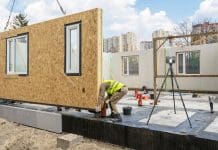Modular construction can create many benefits for the environment in addition to efficiency and cost savings as outlined here by Suhayl Laher of Tiles Direct
As time goes on and our planet feels the weight of human activity, the need for sustainable solutions has risen substantially. We now understand the impact that construction alone can have on the environment, with the UK industry using more than 400 million tonnes of materials every year – making it the nation’s largest consumer of natural resources. Eco-conscious manufacturing techniques have become more popular in recent decades as a result, with a modular construction approach, in particular, offering builders the chance to save both money and time while helping support the planet too.
Eco-friendly building materials
Many modular construction companies are adopting an environmental approach throughout all of their processes. This means incorporating eco-friendly building materials is now an innate part of the modular building process, lowering the environmental impact of prefabricated builds and reducing their overall waste consumption.
The drastic reduction in wasted materials is primarily down to the fact that modular units are built in a highly controlled environment, instead of on-site at a traditional project location. Obsolete waste materials that would normally be sent to a landfill off-site can instead be recycled in other projects and for different purposes. Not only that, but the materials themselves are often eco-friendly from the get-go, with materials like FSC-approved timber and sustainably sourced steel regularly found in modular construction projects.
Reduced energy consumption
Because modular construction companies operate in a controlled environment, the energy poured into the assembly process is only a fraction of that which would be used on-site. The majority of parts built in this way are built in a system similar to an assembly line, which reduces the time spent on building individual parts and removes the need to assemble individual materials on-site.
This efficiency is part of the reason modular manufacturing requires substantially less energy than other traditional assembly techniques. In modular builds, everything from the bathroom wall tiles to the drainage systems are integrated from the start – reducing assembly time, minimising wasted material and providing a consistent quality level throughout.
Reusability
With a recent surge of interest in building reusability and recyclability, modular builds can provide the flexible solution the buildings of the future need. Prefabricated sections are far easier to disassemble and relocate to different sites, thanks to their pre-assembled parts. If a building has become obsolete or disused, modular parts can be saved so that they don’t go to waste.
If modular construction techniques became the norm, the requirement for fresh, raw materials for every new project would be substantially reduced. Where homes have become disused, whole rooms or even entire floors could be lifted out for use in other projects. In the UK, where we need to build an estimated 300,000 homes each year to help solve the housing crisis, this could be a huge asset. The innate flexibility of prefabricated homes could go a long way to support construction companies in their efforts to meet government targets, while also dramatically reducing the industry’s burden on the environment.
Less noise pollution
Because modular sub-assemblies are completed in a factory, the construction site will require considerably fewer personnel than a traditional site would. Without the need for building material deliveries, noisy on-site machinery or large numbers of staff, noise pollution is reduced dramatically. Besides the environmental benefit, this also means sites are less likely to receive complaints and can be built both quicker and more harmoniously with the surrounding community – both of which are vital in busy urban areas.
As the demand for sustainability seeps into every major global industry, innovations like modular construction could be the future for the industry. From bathroom pods to entire homes, the uses for prefabrication techniques extend across the entire building spectrum. With heavy pressure to reduce the industry’s environmental footprint, and the impressive speed of modular construction innovation, the green benefits of this relatively new technique deserve to be considered.
Suhayl Laher
Tiles Direct

















